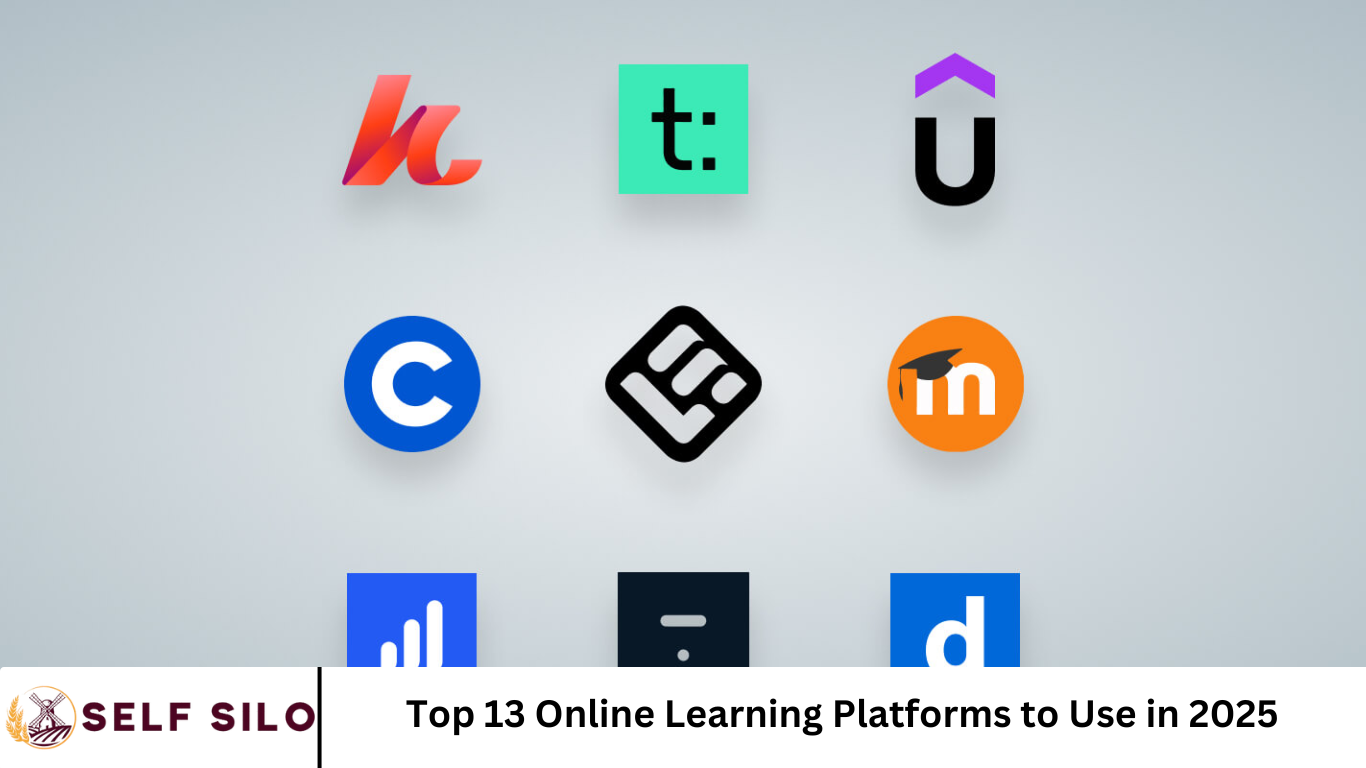Online learning platforms are more important than ever. Whether you’re a lifelong learner, a professional upskilling, or an educator looking to teach online, the right e-learning platform can make all the difference. In this comprehensive guide, we explore the top 13 platforms to use in 2025, highlighting their strengths, pricing, and best-use scenarios.
More Read: Crafting an Exceptional Software Engineering Résumé
Why Choosing the Right E‑Learning Platform Matters
- Diverse course selection – From tech and business to arts and wellness.
- Flexible learning formats – Self‑paced, instructor‑led, micro‑learning, and certification tracks.
- Credibility and certification – Partnerships with universities, accreditations, outcome-based credentials.
- Learning ecosystem – Peer community, quizzes, assignments, analytics, and mentor support.
- Cost and ROI – Free resources, subscription models, and corporate pricing.
1. Coursera
Best for: University-level courses and degrees.
- Features: In partnership with top universities like Yale, Stanford, and University of Toronto. Offers full bachelor’s and master’s degrees, professional certificates, guided projects.
- Pricing: Audit free, paid courses $39–$79, degree programs $15k–$25k.
- SEO Keywords: “Coursera 2025”, “online university courses”, “Coursera degree”.
2. edX / edX for Business
Best for: Academic rigor combined with professional advancement.
- Features: Non-profit platform offering MicroMasters, Professional Certificates, and full degrees from MIT, Harvard, Berkeley.
- Pricing: Audit free, verified tracks $50–$300 per course, full degrees $10k–$25k.
- SEO Keywords: “edX MicroMasters 2025”, “Harvard online courses”.
3. Udemy
Best for: Budget-friendly, wide variety.
- Features: 250k+ courses on tech, personal development; instructor-driven; frequently discounted.
- Pricing: Per-course pricing $9.99–$199; lifetime access.
- SEO Keywords: “Udemy 2025 courses”, “cheap Udemy online learning”.
4. LinkedIn Learning
Best for: Career-focused, especially in business, design, and tech.
- Features: Thousands of professionally produced courses, LinkedIn skill endorsements, certificates.
- Pricing: $29.99/month or $239.88/year; first month free.
- SEO Keywords: “LinkedIn Learning certification”, “LinkedIn skills online”.
5. Skillshare
Best for: Creative skills and community learning.
- Features: Video-based creative classes in illustration, photography, writing; project-based classes, vibrant learning community.
- Pricing: $19/month or $99/year.
- SEO Keywords: “Skillshare 2025 creative courses”, “learn illustration online”.
6. FutureLearn
Best for: Short courses and microcredentials.
- Features: Owned by UK Open University. Offers short specialist tracks, microcredentials, and degrees.
- Pricing: Free access + upgrades, programs $60–$300, degrees $8k–$12k.
- SEO Keywords: “FutureLearn microcredentials”, “UK online learning 2025”.
7. Pluralsight
Best for: IT, developer, and creative software upskilling.
- Features: Skill assessments, learning paths, expert-authored content, offline viewing.
- Pricing: $29/month Standard, $45/month Premium (exam prep, interactive courses).
- SEO Keywords: “Pluralsight tech courses 2025”, “IT certification training online”.
8. Khan Academy
Best for: K–12 learning and foundational subjects.
- Features: Completely free, widely trusted, aligned with school curricula; math, science, SAT prep.
- Pricing: Always free. Donations accepted.
- SEO Keywords: “Khan Academy free learning”, “K–12 math online”.
9. MasterClass
Best for: High-production value, celebrity-led learning.
- Features: Lessons from famous actors, chefs, athletes; cinematic video quality, PDF workbooks.
- Pricing: $15/month (billed annually).
- SEO Keywords: “MasterClass 2025”, “celebrity online classes”.
10. Alison
Best for: Free certifications and micro-learning.
- Features: Free courses with certificate of completion; paid upgrades for certificates; partner programs with Microsoft, Google.
- Pricing: Free courses; certificate/reports $20–$100.
- SEO Keywords: “Alison free certification”, “online diploma courses”.
11. Teachable
Best for: Creators launching their own course business.
- Features: Platform for building, marketing, and selling your own courses; analytics; integration with payment gateways.
- Pricing: $39–$299/month + 0–5% revenue share.
- SEO Keywords: “Teachable platform 2025”, “create online course business”.
12. Thinkific
Best for: Course creators (no coding).
- Features: Easy course builder, community forums, quizzes, completion certificates, native marketing.
- Pricing: Free tier available; paid from $39/month.
- SEO Keywords: “Thinkific course creator”, “best online teaching platform”.
13. Coursera for Teams / Udacity Nanodegrees
Best for: Employers and corporate training.
- Coursera for Teams: Tailored professional development, analytics dashboard.
- Udacity: Specializes in Nanodegree programs (AI, self-driving cars, cloud, etc.) with project reviews and mentor support.
- Pricing: Team plans with custom quotes; Udacity Nanodegrees $399–$799/month.
- SEO Keywords: “Udacity nanodegree 2025”, “corporate e-learning platform”.
How We Chose the Top 13 Platforms
- User satisfaction: Avg. ratings 4.4+ across Trustpilot, Capterra, G2.
- Course variety: Range from academic to vocational.
- Certification credibility: University-backed, LinkedIn‑recognized, industry credentials.
- Pricing value: Free tiers, subscriptions, affordable degrees.
- Usability & support: Mobile app, community Q&A, mentoring, offline features.
Feature Comparison Table
| Platform | Best For | Price Range | Free Tier | Accreditation | Unique Feature |
|---|---|---|---|---|---|
| Coursera | University-level credentials | $39–$79/course, $15k+ degrees | ✅ Audit | ✅ University | Full online degrees |
| edX | Academic rigor + prof certs | $50–$300/course, $10k+ degrees | ✅ Audit | ✅ University | MicroMasters & Professional Certificates |
| Udemy | Budget and variety | $9.99–$199/course | ❌ | ❌ | Lifetime access |
| LinkedIn Learning | Career-focused learning | $29.99/mo | ❌ | Skill endorsements | |
| Skillshare | Creative learning | $19/mo or $99/yr | ❌ | ❌ | Project-based classes |
| FutureLearn | Short courses & credentials | $60–$300/upgrade, $8k–$12k degrees | ✅ Partial | ✅ Univ & Prof | UK university collaboration |
| Pluralsight | Tech & dev skills | $29–$45/mo | ❌ | ✅ (via certs) | Skill assessments and paths |
| Khan Academy | K–12 foundational learning | Free | ✅ Free | ❌ | Curriculum-aligned resources |
| MasterClass | High production, celebrity-led | $15/mo | ❌ | ❌ | Cinematic courses |
| Alison | Free micro-certifications | Free, $20–$100 certs | ✅ Free | ❌ | Free certified learning |
| Teachable | Course entrepreneurs | $39–$299/mo + revenue cut | ✅ Limited | ❌ | Built‑in payment and analytics tools |
| Thinkific | Creators with community needs | Free–$99+/mo | ✅ Yes | ❌ | Community forums |
| Udacity (Nanodegree) | Job-ready tech training | $399–$799/mo | ❌ | ✅ Industry | Mentor support and real-world projects |
| Coursera for Teams | Corporate training | Custom pricing | ❌ | ✅ Univ & Prof | Admin dashboard, team insights |
Tips for Choosing the Right Platform in 2025
- Define your goal – Are you learning for fun, improving soft skills, or seeking accredited credentials?
- Check accreditation – For career advancement, choose platforms with recognized certifications or university degrees.
- Compare budgets – Determine whether a one-time course fee or subscription is more viable.
- Explore features – Look for mentor support, community forums, project-based learning, offline access.
- Use free trials – Many platforms offer free access or trial periods—explore before subscribing.
- Evaluate learning formats – Prefer self-paced, cohort-based, instructor-led, or hybrid models?
- Read reviews – Check Trustpilot, Reddit, Quora for feedback from real learners.
The Future of Online Learning in 2025 and Beyond
Expect these key trends to shape the future:
- AI-enhanced platforms – Personalized learning paths powered by AI (e.g. Coursera SkillsGraph).
- Micro‑credentials – Learner-ready badges from platforms like edX, FutureLearn, and Credly.
- Mentor‑driven learning – Emphasis on peer and instructor support (Udacity, Coursera Project Network).
- Corporate training integration – Seamless LMS-to-enterprise team learning via LinkedIn Learning, Coursera for Teams.
- Immersive learning – Rise of AR/VR and gamified learning experiences on Skillshare, MasterClass, Degreed.
Frequently Asked Question
What is the best online learning platform in 2025?
Coursera and edX are widely considered the best overall in 2025 due to their partnerships with top universities, industry-recognized certifications, and a wide variety of courses, including full degree programs.
Which platform is best for learning tech skills like coding and AI?
Pluralsight, Udacity, and Coursera lead in tech education. Pluralsight is ideal for software developers, while Udacity offers hands-on, mentor-supported Nanodegree programs in AI, data science, and cloud computing.
Are there free online learning platforms that offer certificates?
Yes. Khan Academy and Alison provide free courses, and Alison even offers free certificates and diplomas (with optional paid upgrades). Coursera and edX also allow free auditing of courses.
What’s the difference between a learning platform and a course platform?
An online learning platform offers a wide catalog of courses (like Coursera or Skillshare), while a course platform (like Teachable or Thinkific) is designed for instructors to build and sell their own courses.
Which platform is best for creative skills like photography or design?
Skillshare and MasterClass are the top platforms for creatives. Skillshare focuses on practical, project-based learning, while MasterClass offers inspirational lessons from world-famous creatives.
Can I earn a full degree through online learning platforms in 2025?
Yes. Platforms like Coursera and edX partner with accredited universities to offer full bachelor’s and master’s degrees online, often at a significantly lower cost than traditional programs.
Are online learning platforms good for career advancement?
Absolutely. Platforms like LinkedIn Learning, Coursera, and Udacity provide industry-specific certifications and skills training that are highly valued by employers and can boost your career in tech, business, or design.
Conclusion
The top 13 online learning platforms to use in 2025 cover a spectrum of use cases—from full degrees and professional certificates to creative expression and entrepreneurial course-building. Selecting the right one comes down to your learning goals, budget, desired credentials, and preferred format.


